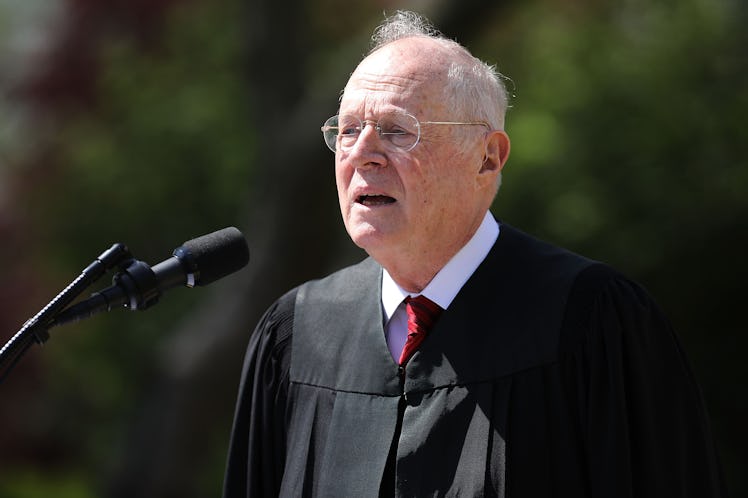
Here's How Justice Kennedy's Retirement Affects Affirmative Action At Colleges
At the end of July, Supreme Court Justice Anthony Kennedy will retire from the bench. Because he is regarded as a swing vote in landmark cases — like his decision in the case that legalized gay marriage — the 81-year-old judge's departure is expected to have a significant impact on major cases in the future. Among them, Kennedy's retirement affects affirmative action cases in clear ways.
Consider the recent history.
In the last major affirmative action case brought before the Supreme Court — Fisher v. University of Texas in 2016 — Justice Kennedy played a decisive role, paving the way for a split 4-3 vote in favor of the use of affirmative action admissions at the University of Texas.
That didn't always seem likely.
Up until that point, Kennedy had a checkered history on the subject of affirmative action. Plus, one of President Barack Obama's appointees on the court, Justice Elena Kagan, had to recuse herself from the case, since she was involved in an earlier iteration of Fisher v. Texas when she worked as solicitor general under the Obama administration.
Thus a 4-4 split vote — in the absence of recently deceased justice Antonin Scalia — along idealogical lines was not possible.
The plaintiff initiated her suit in 2012, arguing that the denial of admission to the University of Texas' 2008 freshman class violated a constitutional right.
Justice Kennedy provided a synopsis of her case in his written opinion.
"Petitioner Abigail Fisher applied for admission to the University’s 2008 freshman class. She was not in the top 10 percent of her high school class, so she was evaluated for admission through holistic, full-file review," he wrote. "Petitioner’s application was rejected. Petitioner then filed suit alleging that the University’s consideration of race as part of its holistic-review process disadvantaged her and other Caucasian applicants, in violation of the Equal Protection Clause."
Justice Kennedy would eventually side with Justices Ruth Bader Ginsburg, Stephen Breyer, and Sonia Sotomayor, in favor of the University of Texas. His ruling stated that public universities could serve as "laboratories for experimentation" in defining how exactly to strike a balance in promoting school diversity.
Kennedy wrote,
The University of Texas at Austin has a special opportunity to learn and to teach. The University now has at its disposal valuable data about the manner in which different approaches to admissions may foster diversity or instead dilute it. The University must continue to use this data to scrutinize the fairness of its admissions program; to assess whether changing demographics have undermined the need for a race-conscious policy; and to identify the effects, both positive and negative, of the affirmative-action measures it deems necessary.
On the other hand, the three, more conservatives justices on the bench opined that the affirmative action practices the court had just approved were inherently discriminatory.
"In [the University of Texas'] view, apparently, 'Asian Americans are not worth as much as Hispanics in promoting cross-racial understanding, breaking down racial stereotypes, and enabling students to ‘better understand persons of different races,' Justice Sam Alito wrote in a dissenting opinion. "The majority opinion effectively endorses this view, crediting UT’s reliance on the classroom study as proof that the University assessed its need for racial discrimination (including racial discrimination that undeniably harms Asian-Americans) 'with care.'”
That dissenting opinion becomes all the more important, considering one major affirmative action case that appears headed for the Supreme Court in the near future. That case argues that Harvard University's affirmative action practices discriminates against Asian-Americans.
If and when the case does reach the Supreme Court, a President Donald Trump-appointed justice is likely to have replaced Anthony Kennedy. And with Trump expected to appoint a more conservative replacement, Alito's minority dissent could well be similar to a future majority opinion.